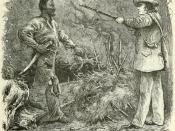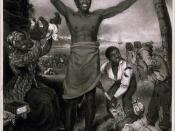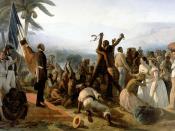Holy Warriors: The Abolitionists and American Slavery
It is historian James Brewer Stewart's thesis that the massive social changes and revivalism in the 1820's had started New England's abolitionist crusade against slavery.
Revivalism had given a powerful impact to abolitionism in the eighteenth century. As Protestants struggled to overcome the adversities of immense new challenges, the abolitionists' crusade for immediate emancipation also took form. During the Great Revivals, people dreamed of a glorious era of a nation without liquor, prostitution, atheism, and popular politics. The effect of revivalism on the ministry was important to abolitionism because it had become a profession. Young people were attracted to aid in abolition of slavery. It was stated that abolitionism was a revolt of youth raised by old New England families. The parents of abolitionists were usually well-educated and participated heavily in revivalism and benevolent projects. Abolitionists commonly paid homage to strong-minded parents whose religious beliefs dominated the households.
In early years, abolitionists were marked with qualities such as a strong sense of individuality, passion about moral issues, and confidence in their ability to improve the world.
The powerful combination of Yankee conservatism, revivalist benevolence, New England upbringing, and social unrest was leading young evangelicals towards a radical vision that formed a militant abolitionist movement. Opposition to slavery certainly constituted a dramatic approval of one's Christian identity and commitment. After the Nat Turner revolt in Virginia, an atmosphere of crisis was opened and attention was intensely fixed on slavery. As there frightening events took place, evangelicals cast aside their self-doubt and gave way to commitments eradicating the sin of slavery. The actions of Nat Turner, the "Nullifiers", and David Walker suggested that slavery was the cause of the society's degraded state.
The sudden embracement of immediate abolition could be understood as a strategic innovation...


